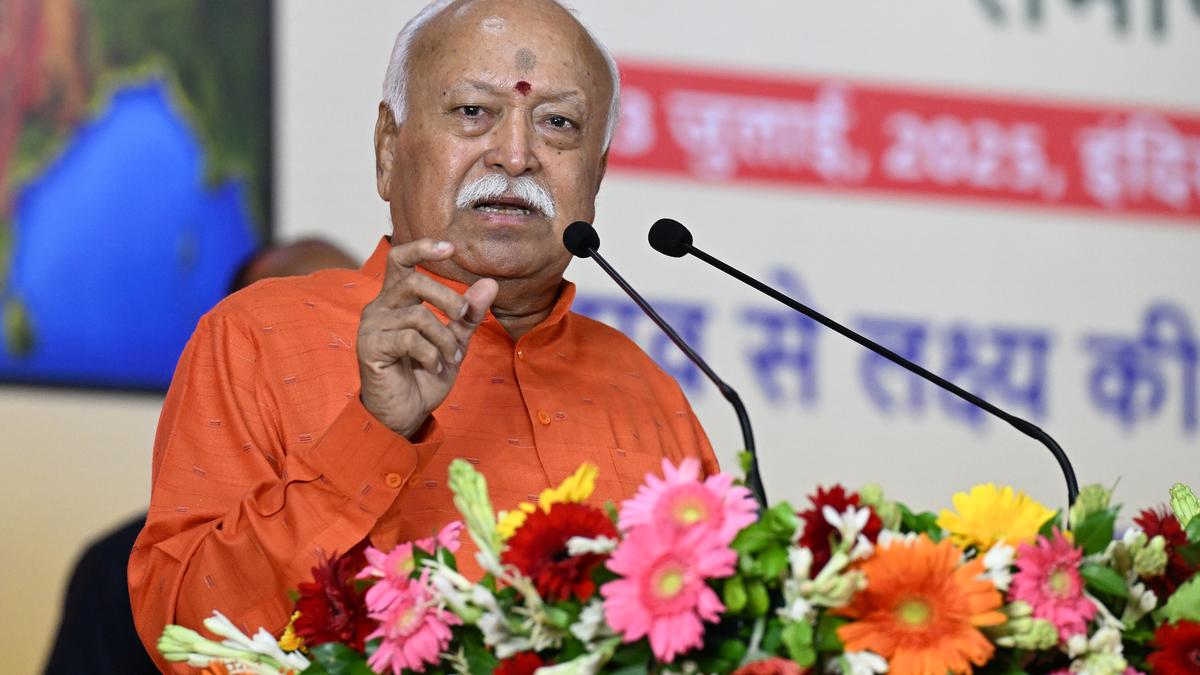
RSS chief Mohan Bhagwat speaking during the 70th year concluding function of Bharatiya Mazdoor Sangh in New Delhi on Wednesday.
| Photo Credit: SUSHIL KUMAR VERMA
Rashtriya Swayamsevak Sangh (RSS) chief Mohan Bhagwat on Wednesday (July 23, 2025) said the main challenge for the country at present revolves around how to integrate the labour, industrial and national interest in the age of technological transformation. He also called for an assessment of the impact of emerging technologies on society and the labour market in a way that it does not impact jobs.
Speaking at an event on the 70th anniversary of Bharatiya Mazdoor Sangh (BMS), Mr. Bhagwat said that equality among the workforce will not be achieved until “people rise above the interests of their own families”. He added that technology makes the human nature a “bit harsh” and “somewhat” reduces the respect for labour.
‘Mother-like empathy’
The RSS chief advised the BMS officials that they must have “mother-like empathy” for everyone in the sector they are involved in so that they can give equal love to everyone.
Stating that technology cannot be rejected and hence it has to be customised as per the need of the society and interest of the labour field, Mr. Bhagwat said: “Technological transformation is another challenge. Every new technology brings concerns, will it lead to an increase in unemployment? Will it dehumanise us?… Knowledge-based technology needs to be thought about with the new perspective, that is its impact on the field. It can devalue the prestige of shram (labour).”
Hailing BMS as the largest labour organisation in the world, Mr. Bhagwat said it has the responsibility to ensure that every emerging situation benefits all sections of society.
‘World is watching BMS’
“The world is watching BMS, and it must rise to this responsibility. How to integrate the labour, industrial and national interest in the age of technological transformation is the biggest challenge for tomorrow,” he added.
Union Labour Minister Mansukh Mandaviya, who also participated in the event, appreciated the efforts of BMS to create unity among workers. He said BMS is the only trade union that works based on the cultural and social principles of India. He said the core ideology of the BMS is nationalism and that was the reason why it became the largest trade union in the country.
An effective voice: Minister
Mr. Mandaviya said as the largest trade union from the country, BMS has effectively raised issues of Indian workers at the International Labour Organization (ILO). The Minister said BMS led all the other Central Trade Unions from India to a recent ILO convention and BMS ensured that all the trade unions spoke in one voice. “Leaders of other trade unions later told me that the BMS allowed each and every union to place their views at the ILO forum,” he said.
He maintained that the present government appreciated the efforts of doctors, nurses and other “Corona warriors” during the pandemic. He said workers in the country rose to the occasion to fight against an epidemic.
BMS president Hiranmay Pandya shared that the 70-year journey of the organisation began in 1955 with the principle of ‘Rashtra Hit, Udyog Hit, and Mazdoor Hit’ (national interest, industrial interest and labour interest).
We have shown the world that labour protesta are not merely about raising slogans, rather it is about constructive nation-building, Mr. Pandya asserted. “Our next milestone is BMS@100, and we are determined to move forward with renewed vigour and commitment.”
Published – July 23, 2025 08:26 pm IST


